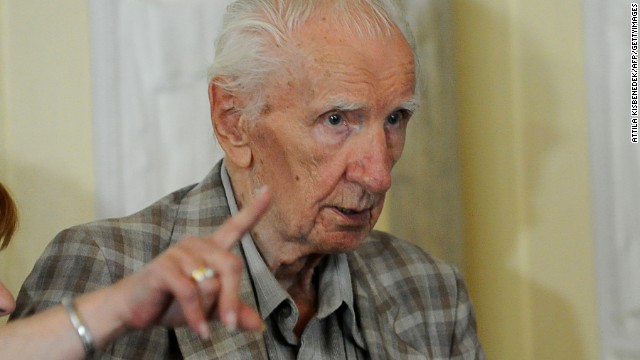By Ben Kopp
Impunity Watch Reporter, Europe
BUDAPEST, Hungary – At age 98, one of the few remaining suspected Holocaust war criminals, Lazlo Csatary died awaiting trial in a Budapest hospital. In so doing, he left many questions unanswered.

Born just south of Budapest in 1915, Csatary became a police officer throughout Hungary until settling in the city of Kosice. In March 1944, Germans occupied Kosice. As commander of the Royal Hungarian Police in the area, Csatary allegedly helped Gestapo round up and deport several Hungarian Jews in cattle wagons. According to witnesses at the trial of Csatary’s commanding officer, by May 1944, Csatary pursued and beat detainees with a dog-whip in the outskirts of Kosice. When cattle wagons, destined for Auschwitz, were packed tightly with people, witnesses claim Csatary forced even more detainees inside. By the end of the war, Csatary allegedly sent over 15,500 Jews to the death camp.
Following a 1948 in absentia conviction for war crimes in Czechoslovakia, Csatary fled to Canada, where he became a citizen and Montreal art dealer. Canada revoked his citizenship in 1997 for lying on his application, stating that he was a Yugoslav national.
In September 2011, the Simon Wiesenthal Centre of Los Angeles received a tip that led them to discover Csatary in Budapest in 2012.
On 18 July 2012, reports indicate that Csatary was taken into custody for questioning. While Slovakia wanted to try him in their courts and even changed his sentence from the death penalty to life in prison to make the verdict executable, Hungary indicted Csatary on 18 June 2013. Csatary denied the allegations against him.
On 8 July 2013, Budapest’s higher court suspended the case, stating that “Csatary had already been sentenced for the crimes included in the proceedings, in former Czechoslovakia in 1948”, and the court needed to determine whether that verdict was valid in Hungary such that Csatary could serve it.
However, on 10 August 2013, Lazlo Csatary died in a Budapest hospital. According to his lawyer, Gabor B. Horvath, his death was caused by pneumonia.
“This is a very unfortunate end to a saga that lasted far too long,” Efraim Zuroff, Director of the Simon Wiesenthal Centre’s Israel Office, said Monday. “Csatary should have been brought to justice shortly after the war. … We gave the Hungarian prosecutors evidence two years ago, and this should have been taken care of months ago in Budapest.”
Zuroff further said, “The fact that a well-known war criminal whose Nazi past was exposed in Canada could live undisturbed for so long in the Hungarian capital raises serious questions as to the commitment of the Hungarian authorities to hold their own Holocaust criminals accountable.”
Absent an official trial and ruling on whether the decedent was the same man who committed atrocities during the Holocaust, the world will never know whether one of the last suspects was anything more than just that. Moreover, absent further search, Holocaust survivors will never know if justice was just in reach, or if justice still waits to be served.
For further information, please see:
BBC News – Lazlo Csatary: Holocaust Questions Go Unanswered – August 12, 2013
Bloomberg Businessweek – Hungarian Suspected Nazi-Era War Criminal Csatary Dies at Age 98 – August 12, 2013
CNN International – Nazi War Crimes Suspect Laszlo Csatary Dies at 98 – August 12, 2013
Euronews – Nazi War Crimes Suspect Laszlo Csatary Dies before His Trial – August 12, 2013
Jewish Telegraphic Agency – Hungarian War Criminal Laszlo Csatary Dies at 98 – August 12, 2013
